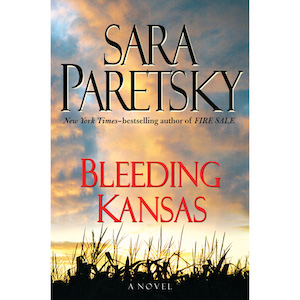Pity Kansas. Its reputation as a conservative state has reached idiomatic proportions, and the query posed by Thomas Frank’s 2004 book, What’s the Matter with Kansas?, doesn’t help it much.
Sara Paretsky’s latest, Bleeding Kansas, is her first novel that’s not a spy story, and it rests upon a familiar novelistic device: uncovering the layers of life in a small town with the assumption that these are somehow paralleled in the larger nation. Set in present-day Kaw Valley, Kan., its events spring from a decades-long feud between the Grelliers and the Schapens. Susan Grellier, wife of Jim and mother to Lara and Chip, is committed to ‘communist’ ideas like grocery co-ops and organic farming. In contrast, Myra Schapen is a fundamentalist Christian matriarch and the writer of a blog that promises hell and damnation upon sinners, her neighbors included. Bleeding Kansas is a novel of big ideas—war, peace, historical memory—filled with details straight out of a horror film: an ancient, abandoned mansion; a tale of a mysterious fire that killed a young male hippie in the free-love ’60s; an indigent and demented woman Elaine who mutters about her murdered baby; a perfectly red heifer whose arrival is hailed by fundamentalist Christians and Jews as the signal to rebuild the Temple in Jerusalem.
Was the fire started by Myra Schapen? Was the young hippie Elaine’s lover and the father of her baby? Will the heifer’s existence spark another conflict in the Middle East?
Do we really care?
While Paretsky vividly describes the strange beauty of the Kansas landscape, she falters in her attempts to maintain suspense. For instance: Susan Grellier’s anti-war stance alienates her son Chip; he enlists in the army and dies in Iraq. That’s not a plot spoiler because Paretsky tells us as much in the pages that lead up to Chip’s death in a series of annoying asides like ‘If he’d [ Jim ] left Chip alone … If. If.’ And: ‘He often wondered … if things would have turned out differently.’ Bereft of the accoutrements of a spy story, Paretsky is like a talkative child entrusted with a secret.
The characters are as flat as the landscape they inhabit. Gina, a lesbian wiccan from Manhattan, is saddled with a cappuccino machine to signify her urbane lifestyle. Susan, despite her dedication to alternative politics, is somehow unaware that the rationale for war has long been disputed until Gina shows her the light. But when even Myra ( who lacks only a broom to complete the witch-like caricature of her ) has a blog, it’s ridiculously unrealistic to think that Susan wouldn’t have come across the anti-war discourse that permeates even conservative websites these days.
Bleeding Kansas strains hard to make a meaningful statement about war and the battle between conservatives and liberals, but Paretsky is behind the curve on these issues. The sad and unbearable reality about this war, which even a novelist could not have dreamed up, is that fiction loses out to the lies we have heard and upon which we have chosen to act.

Originally published in Windy City Times, February 20, 2008
